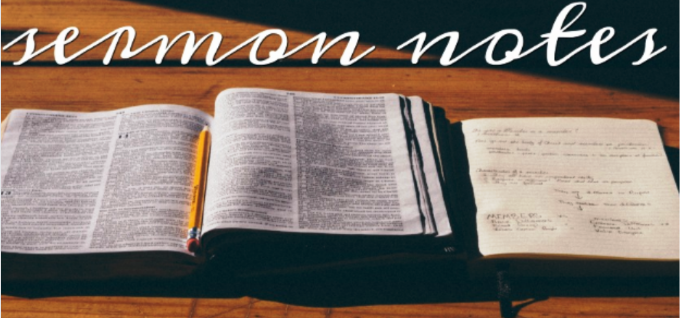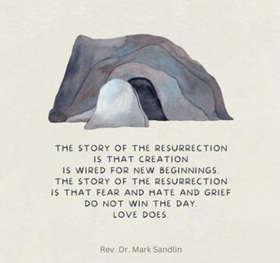
“He is Risen”
Father Peter Fitzgibbons
March 30 – 31, 2024
Gospel: John 20:1-9
People say, “Women have no power in the Church.” No, but women have more courage. Look at the Gospels and the courage of women. Can you imagine how the women who went to the tomb felt? That is the transforming power of faith. Now, I know we have law enforcement here. We also have medical people, the fire department, and combat veterans. They can tell you what would happen to a dead body after three days in the Palestinian heat especially one with open wounds. You aren’t going to want to be near it. Whew! There is no amount of Vicks Vapor Rub or Febreze that will cover up that stench. But their love for Christ triumphed over their natural reluctance to do what we would say is disgusting. Their love for the Lord gave them the courage to overcome their reluctance to go to the tomb and anoint the Body of Jesus. I’m sure they knew exactly what they were getting into. During that time, life was a lot more brutal and harsher than it is today. We live a much cleaner life. That’s what faith does. Faith can transform our fear into love. The women were going to the tomb to do a proper work of mercy for our Lord. They didn’t have to, but they did. And because of their love, these women were the first to behold the empty tomb and the resurrection. Afterward, they brought Peter and John to the tomb, and Peter went inside.
I’m old enough now to hide my own Easter eggs. As time passes by, you realize that your celestial discharge is approaching. We have a natural fear of death. We were never supposed to die. Our first parents are responsible for that; however, we have helped with the sins we have committed after baptism. Sin brings fear, and sins committed after baptism increase that fear. But the love of God can transform that fear and turn it into a longing, not to leave our loved ones behind, but to go be with the Beloved. God wants us to be with Him, and He offers His love to transform our fear into love. In the Gospel of Saint John, Jesus said, “I am going now to prepare a place for you, and after I have gone and prepared you a place, I shall return to take you to myself, so that you may be with me where I am” (John 14:2-3). We will go to join our good Lord, all those who wait for us, and all the saints who prayed for us.
I had an interesting episode of God’s Mercy last Thursday while doing my rounds at the hospital. We have a new hospice chaplain, and when I saw him, I wanted to say, “I was here before you came, and I’ll be here after you leave. You’re the sixth hospice chaplain I’ve seen come through here.” I’ve been at the VA hospital for quite a while. But he’s a great guy, and he told me there was someone for me to see in the hospice unit. I said, “Okay.” So, I went in to talk to the patient. He was in very bad shape and did not make it to the weekend. He had been in Vietnam. He had been Baptist, became a Catholic, became a priest, left the priesthood, was laicized, and got married. I’m not sure where the lady was, and I didn’t bother to ask. But he made his peace with God. Father Elkhart from Sacred Heart came over and heard his confession. I talked with him for a while, or as much as I could because he was in such discomfort. I gave him the Apostolic Pardon because I take care of my own. He was a soldier, and I was a soldier. That is God’s mercy. He wants us to be at peace.
The resurrection is true, and its power is still alive and active. Our Lord offers us His life. If the resurrection wasn’t true, then all of this would be worthless. He gives us the gifts to change what we have caused by sinning. Even sin cannot compete with God’s plans. All He asks for is our cooperation to draw ever closer to the Sacred Heart of His Son so that we can be transformed. Those fears we have, and we all have fears, of leaving this life and going to God will be changed. The transforming power of God’s love elevates us above and beyond our natural fears and limitations. The resurrection is true. His power is still active. Christ is risen.

You can read all of Father Fitzgibbons’ sermons by going to AnnunciationCatholicAlbemarle.com, clicking on “Blog” then “Categories” and then “Sermon Notes.” On a cell phone: click on “Blog” and then “Menu.” Scroll to the bottom and click on “Categories.” Sermon Notes are also available on the Church’s Facebook page at OLA.Catholic.Church. Click on “Groups” and then “Sermon Notes.”








